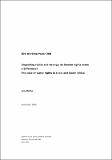Unpacking rights and wrongs : do human rights make a difference? : the case of water rights in India and South Africa
Abstract
This paper focuses on why poor and marginalised people still lack access to economic, social and cultural
rights (also known as positive rights), despite a fairly mainstream support to positive rights in mainstream
development debates. In part this is due to the problematic division between so-called first and second
generation of rights. This is particularly true in the water debate where dominant narratives more often see
water as an economic good rather than as a human right.
Rights also fail to be realised due to sins of omission where poor states may lack the institutional
capacity or financial resources to provide rights. Similarly, citizens may not be aware of rights and may not
have the capacity to mobilise around them. Lack of rights may also be due to sins of commission. Thus states
or non-state actors such as the World Bank may knowingly put vulnerable people’s rights at risk or even
violate them with impunity. Economic globalisation also leads to policies that violate basic rights where
diffuse and unclear rules of accountability exist for global and local players.
The paper focuses on the right to water in South Africa to examine sins of omission and looks at
forced displacement caused by the Narmada dams in India to examine sins of commission. In both cases,
it examines local-level dynamics of rights grievances and claims and argues that there is a blurriness
between policy and practice around rights practice and violation and that there are often overlaps between
sins of omission and commission. Finally, the paper highlights the need for accountability structures and
mechanisms through which compliance and answerability can become an indispensable aspect of the
human rights regime.
Keywords: human rights; economic, social and cultural rights; citizenship; accountability; right to water;
forced displacement; Narmada Project; India and South Africa.

